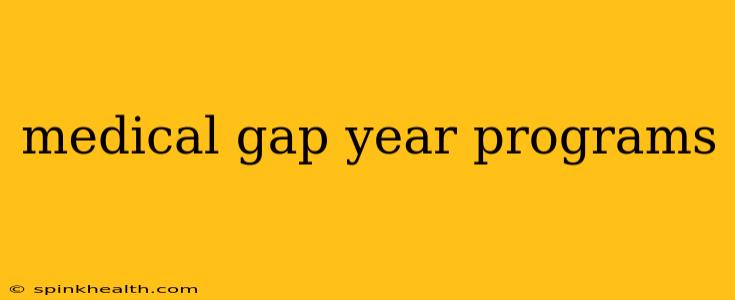Charting Your Course: A Guide to Medical Gap Year Programs
The journey to becoming a doctor is long and demanding. Many aspiring physicians find themselves questioning whether to take a break before diving headfirst into medical school. That's where the concept of a medical gap year program comes in. It's not just a year off; it's a strategic intermission, a chance to recharge, refocus, and enrich your application before embarking on the intense rigor of medical school. This isn't about slacking off; it's about strategic preparation and personal growth. My own path included a gap year, and looking back, it was one of the most valuable periods of my journey. Let's explore what makes a medical gap year program effective and what options are available.
What are Medical Gap Year Programs?
Medical gap year programs aren't formally structured programs in the same way as, say, college courses. Instead, they represent a deliberate period of time between completing undergraduate studies and starting medical school. During this time, prospective medical students engage in activities designed to enhance their medical school applications and bolster their personal and professional development.
This could involve anything from volunteering in a clinical setting to conducting research, traveling, working, or pursuing a passion project. The goal is to gain experiences that enrich your application, making you a more well-rounded and compelling candidate. Think of it as adding vibrant colors to the otherwise monochromatic narrative of your academic transcript.
What are the Benefits of a Medical Gap Year Program?
Strengthening Your Medical School Application: This is the most tangible benefit. A well-spent gap year can significantly boost your application by demonstrating:
- Maturity and Self-Awareness: Navigating challenges independently and learning from experiences beyond the classroom showcases growth.
- Clinical Experience: Volunteering in hospitals, clinics, or research labs allows you to gain firsthand experience in the medical field, solidifying your commitment to medicine.
- Research Experience: Participating in research projects demonstrates your dedication to scientific inquiry and critical thinking, crucial skills in medical practice.
- Leadership Skills: Taking on leadership roles in volunteer organizations or community initiatives showcases your ability to guide and inspire others.
- Enhanced Personal Statement: Your experiences during your gap year will provide rich material for a compelling and insightful personal statement.
Personal Growth and Development: Beyond application enhancement, a gap year offers crucial personal growth opportunities:
- Stress Reduction: A break from intense academic pressure can reduce stress and improve mental well-being.
- Self-Reflection: The time for introspection allows you to assess your goals and clarify your path toward medicine.
- Exploration of Interests: You might discover new passions or reaffirm existing ones, enriching your life beyond the confines of academic pursuits.
- Improved Resilience: Overcoming challenges during a gap year builds resilience and adaptability, invaluable qualities for a successful medical career.
What activities can I pursue during a medical gap year?
The possibilities are vast, only limited by your imagination and resources. Here are a few common and effective avenues:
- Clinical Volunteering: Gain hands-on experience by volunteering at hospitals, clinics, or nursing homes.
- Medical Research: Participate in research projects at universities or medical institutions.
- Shadowing Physicians: Observe physicians in their daily practice to gain insights into various medical specialties.
- Healthcare-Related Jobs: Work as a medical assistant, scribe, or in other healthcare-related roles.
- International Medical Experiences: Volunteer or work in underserved communities abroad.
- Community Service: Engage in community service projects related to health and well-being.
How do I plan a successful medical gap year?
Planning is key. Start early (ideally a year or more in advance) to secure placements, funding, and necessary documentation. Your planning should include:
- Identifying your goals: What do you hope to achieve during your gap year?
- Researching opportunities: Explore various options, considering your interests and skills.
- Developing a timeline: Create a realistic schedule for your activities.
- Securing funding: Explore funding options, such as scholarships, grants, or part-time jobs.
- Networking: Connect with professionals in the medical field to gain mentorship and guidance.
Is a Medical Gap Year Right for Me?
Ultimately, the decision of whether or not to take a medical gap year is personal. Consider your own individual circumstances, goals, and readiness for the intense commitment of medical school. If you feel burnt out, need time for self-reflection, or want to significantly strengthen your application, a well-planned gap year can be immensely beneficial. If you feel fully prepared and motivated, you might find the direct path more effective.
The journey to becoming a physician is a marathon, not a sprint. A strategically planned medical gap year can provide the essential rest stop, allowing you to recharge, refocus, and ultimately arrive at your destination stronger and more prepared than ever.

